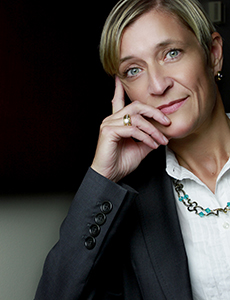How to Support Women’s Insurance Leadership Ambitions According to These Four CEOs

Women lead just under 10% of Fortune 500 companies, according to the 2022 Women CEOs in America report. Within the insurance industry, women hold 21% of executive and officer positions at publicly traded insurers.
This hidebound lack of representation is being addressed through various DEI initiatives and industry efforts to eliminate the gender pay gap. Still, it’s important to have open conversations about changing the face of the industry.
Hundreds of attendees ended their first day at ITC 2022 in Las Vegas by attending a leadership discussion and reception in the Palm Foyer of Mandalay Bay. The “Women in Leadership Forum: Your Path to the C-Suite,” presented by GoGiles and CCC Intelligent Solutions, featured a panel discussion and audience questions, along with an open bar and informal networking time.
The well-attended forum had standing room only as attendees listened to the stories and advice from the C-suite panelists.
Hosted by Megan Kuczynski, president at InsureTech Connect, and featuring four women CEOs, the panel was designed to promote women in leadership. With C-suite women as speakers and role models, the discussion was lively, vibrant and thought provoking.
Joining Kuczynski on stage was Jacqueline LeGrand, CEO and co-founder at Maptycs; Luann Abrams, founder at CEOX; Rachel Olney, CEO and founder at Geosite; and Sabine VanderLinden, CEO and co-founder at Alchemy Crew. The diverse panel answered questions about leadership, overcoming obstacles and success.
Tackling the Gender Pay Gap
The audience had questions for the panelists about how to tackle the gender pay gap — always a hot topic.
Olney spoke about the effect compensation choices have on people at startups. She described how new employees are offered an option to take part of their salary in equity. Individuals who can afford to forego more of their current salary to take a higher portion of compensation in equity can quickly outscale those who can’t afford to pass up so much of their current salary.
Abrams advocated talking about salary and negotiating offers, saying, “Normalize talking about salary. It is a simple thing you can do to help narrow the pay gap. Always negotiate an offer. Most women don’t negotiate their very first offer, and that lower salary follows them throughout their career.”
The panelists reminded the audience they have the right to share salary information and that a pay gap based on gender is illegal. LeGrand supported this, suggesting women ask their male colleagues their opinions on salary negotiations.
VanderLinden commented that women are often judged on their past performance whereas men are judged on future potential, a lingering perception that may add to the gender pay gap when it is time for raises and bonuses to be distributed.
Changing the Look of a CEO
Several panelists shared stories of being overlooked at conferences with male colleagues, describing feeling like they weren’t even part of the conversation when questions about their company were directed to the male colleague standing next to them.
Olney spoke about not meeting the stereotype of how people expect a CEO to look. “People don’t expect a CEO to be a young woman. So, I’m changing what a CEO looks like.”
LeGrand described her early career: “I did my best not to be seen as a female but as a professional.”
She spoke about her growth throughout her career, finding a balance between raising a family and keeping her professional and personal lives separate. She described prioritizing the late-night strategic meetings that perhaps women have had to miss in the past because of family constraints.
She made it work: “I had my priorities and my roadmap. I didn’t expect things would be easy — and I enjoyed my journey!”
Pausing to reflect, LeGrand concluded, “It’s time to change the world,” to a round of audience applause.
VanderLinden spoke about the importance of finding mentorship, commenting, “I needed to find inspirational leaders who believed in me.”
And often, it’s critical to see yourself reflected in your mentors and leaders. Sometimes this can be a challenge for women working in an industry traditionally run by men.
Abrams spoke candidly about the obstacles women may face when growing their careers with C-suite aspirations.
She reminded the audience of the value women leaders bring to an organization: “It can be incredibly difficult for women in male-dominated fields to remember what amazing leaders they are. I like to remind women that they naturally have the skills to be great leaders and should know their value,” she said.
“Companies with women leaders grow faster, generate more revenue, exit earlier, and have happier employees, so it is crucial that we support them not just as a societal good but as an economic one.”
Men Can Be Allies at Work
Half of the attendees at this leadership forum were men, affirming the work we are all doing to grow representation in the C-suite is a shared goal. The panelists spoke about how men can be allies and support women.
Abrams elaborated on male allyship: “Most men I encounter know the value women bring, but they can be blind to the realities that women face in the office.
“I really love suggesting actions men can take to support the women they work with,” she continued. “It can be everything from ensuring their female colleagues are not being interrupted in meetings, acknowledging women by name for presenting their ideas so others don’t take credit, to advocating for women for promotions. It’s nothing difficult, but it needs to be done.”
Abrams described being deliberate about building leadership teams and your board, which is an action both men and women should take.
She explained startup boards are often male-dominated, reflecting the makeup of venture capital investment firms. She advocated bringing in independent board members sooner rather than later to grow diversity.
“If being a CEO is a board member requirement,” said Abrams, “you’re eliminating lots of women from consideration because few women are CEOs currently.”
This simple act of increasing board diversity can inspire change throughout the levels of the company.
LeGrand’s advice to men in the workforce was succinct and lighthearted while delivering a powerful message: “This is not a man’s world anymore — share the road!” &












